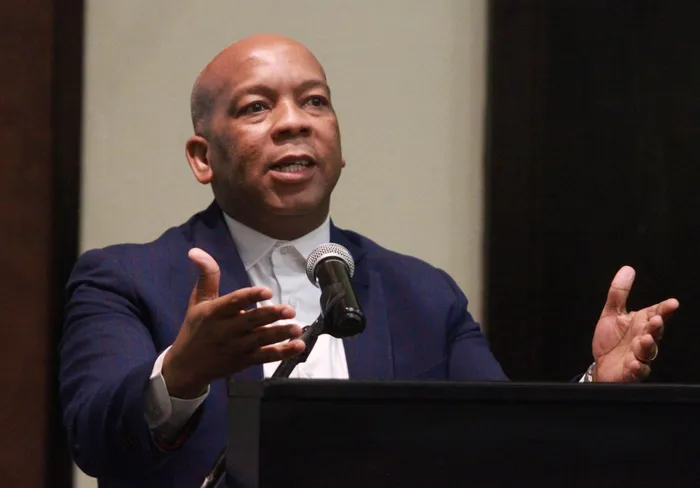Government will fine-tune electrification programmes amidst R13bn budget - Ramokgopa

Minister for Electricity and Energy, Kgosientso Ramokgopa presented the department's Budget Vote in Parliament on Wednesday.
Image: Supplied
Banele Ginidza
Minister for Electricity and Energy, Kgosientso Ramokgopa, has said that as only R13 billion had been allocated to the integrated national electrification programme over the medium term expenditure period, the allocation would be used as a de-risking instrument to crowd in developmental capital and concessional finance.
Presenting the department's Budget Vote in Parliament on Wednesday, Ramokgopa said the department was working in close partnership with development finance institutions and the National Treasury in developing an infrastructure finance facility that will enable the frontloading of capital requirements through debt market instruments.
"The aim is to mobilise balance sheet financing whilst preserving affordability and fiscal discipline. By using the public allocation as an anchor, the strategy allows for accelerated electricity rollout in high priority provinces and municipalities, greater geographic equity and predictable project pipeline attractive to institutional invetsors," he said.
"The approach positions universal access as a bankable development investment with measurable returns in health, education and economic participation."
Ramokgopa said as Eskom's ability to collect revenue for the services provided continued to decline and municipal debt - currently at just below R100bn after compounding by R3bn a quarter over the past year - the department hoped that the the Distribution Agency Agreement (DAA) being put in place would realise benefits for the sustainability of the entire distribution industry.
Ramokgopa said the DAA would assist municipalities with their reticulation and distribution of electricity business, revenue collection and retail services.
He said the DAA has dual potential to support municipalities to provide sustainable local services while contributing to the sustainability of Eskom.
"Some of the benefits realised at these municipalities where these DAAs have been implemented include increased payment levels from 10% to 30% after meter audits and replacement, being assisted to resolve customer disputes with their customers, settle their current accounts with Eskom in full and improved turnaround times to faults," Ramokgopa said.
Speaking on behalf of the South African Local Government Authority (Salga), Mayor of Tswelopele Local Municipality, Kenalemang Phukuntsi, said the role of municiplaities was increasingly becoming vague in the amended Electricity Regulations Amendment Act (ERA) of 2024 and Just Energy Transition (JET) programmes.
Phukuntsi said while the department's emphasis on a central authority was understandable for coordination, Salga was concerned that the role of municipalities, especially in distribution and the new energy market, was increasingly unclear.
She said even within the ERA, the principal place of municipalities as key actors in the future market was not defined in a way that assured of their continued constitutional mandate.
Phukuntsi said the Act still introduced a definition for electricity reticulation that Salga deemed as reducing its mandate to just lower levels of customer and voltage.
"We still see that as an unconstitutional definition. The minister must still do industry-wide consultation unlike when it was inserted in the Bill without proper consultation. We cannot have a JET if it sidelines the very sphere closer to the core of our communities," she said.
Phukuntsi said the strategic plan in the medium term allocations made little reference to the urgent reform required in the electricity distribution industry while the sector was on the verge of collapse in many municipalities.
"We urge the department to align its plans with support for real local government, not just technical but institutional and financial and legislative, to ensure municipal distributions are strengthened and capacitated," she said.
"We request further urgent clarification on how the roadmap aligns with the JET implementation plan, the National Treasury Metro Trading Entity Reform, and the unresolved issue of municipal debt to Eskom."
Phukuntsi said Salga noted that 71% of the R27bn of the medium term allocation was directed to the programmes and projects largely through transfers to Eskom and municipalities.
"Salga appreciates the inclusion of municipalities but also calls for the equitable transparent allocation criteria, greater flexibility in grant conditions to prevent funds being sent back to the National Treasury, and therefore disadvantage the communities," she said.
Phukuntsi said Salga wanted an assurance that municipalities infrastructure backlogs were addressed through this grant, particularly in historically underserved communities.
She said Salga also wanted the government to introduce sustainable energy packages that do not solely rely on grid availability such as off-grid or micro-grid programmes to cover areas far from grid.
BUSINESS REPORT